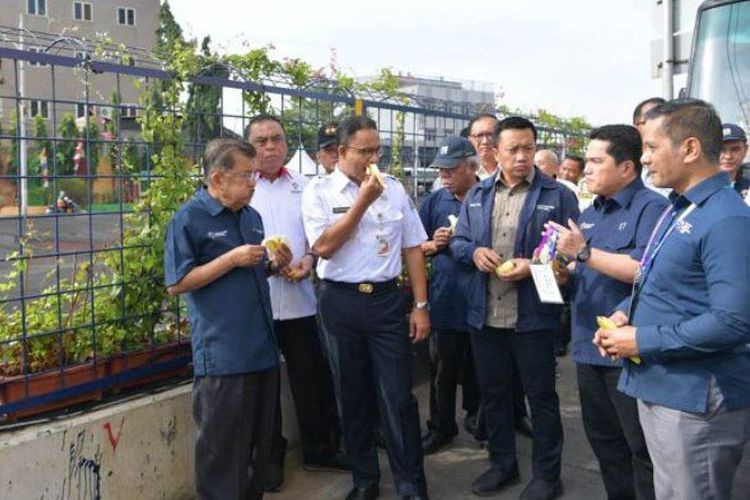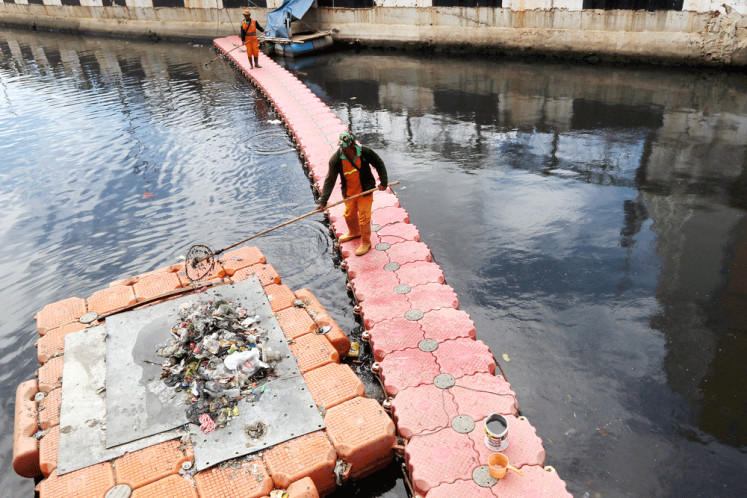Popular Reads
Top Results
Can't find what you're looking for?
View all search resultsPopular Reads
Top Results
Can't find what you're looking for?
View all search resultsBusinesses ready to support Anies' detergent plans
Detergent manufacturers have pledged to push companies to produce environmentally friendly detergents.
Change text size
Gift Premium Articles
to Anyone
 Jakarta Governor Anies Baswedan (thrid left) snacks on bananas with Vice President Jusuf Kalla (left) and several ministers on the banks of the Sentiong River near the Kemayoran Athletes Village in Central Jakarta on Aug. 3, 2018. As the host of the 2018 Asian Games, officials rushed to employ several measures to clean up the river – dubbed "black river" for its heavily polluted state – ahead of the international sports event. (Via kompas.com/Humas Wapres)
Jakarta Governor Anies Baswedan (thrid left) snacks on bananas with Vice President Jusuf Kalla (left) and several ministers on the banks of the Sentiong River near the Kemayoran Athletes Village in Central Jakarta on Aug. 3, 2018. As the host of the 2018 Asian Games, officials rushed to employ several measures to clean up the river – dubbed "black river" for its heavily polluted state – ahead of the international sports event. (Via kompas.com/Humas Wapres)
D
etergent manufacturers and the laundry industry have said they would work with the government in pushing for better product standardization to solve the pollution of Jakarta’s rivers, caused mainly by the excessive use of detergents.
Detergent manufacturers have also pledged to urge companies to produce environmentally friendly detergents.
Indonesian Laundry Association (ASLI) chairman Apik Primadya said that the organization was keen to speak with the Jakarta administration to make sure that a new city regulation on detergent use would help both business and the environment.
“We are ready to support the Jakarta administration to create a better regulation on detergents […] So far, 70-80 percent of our members have been educated to use low-foam detergenst,” he told The Jakarta Post over the weekend.
ASLI has 20,000 members in 18 provinces that mostly run coin-operated laundromats or bulk laundry services. Most of the association’s members presently dispose waste by dumping it directly in drains, just like household waste.
Jakarta Governor Anies Baswedan recently said that he would issue a new regulation on car wash and laundry services in the city after determining that the detergents the businesses used could worsen water pollution in the capital.
Workers remove trash from the Sentiong River, also known as Kali Item (Black River), on Thursday. Jakarta’s rivers are heavily polluted by solid and liquid waste because of a lack of waste treatment facilities and residents’ littering habit. (The Jakarta Post/Dhoni Setiawan )Anies said that some of the most polluted rivers in Jakarta, such as the Sentiong River – infamously nicknamed "black river" by local residents – were polluted by detergent-heavy runoff from industry and households.
He also called on the Trade Ministry and the Industry Ministry to issue better regulations on detergents.
Responding to Anies' plan, director general of textile, chemical and miscellaneous industries Achmad Sigit Dwiwahjono at the Industry Ministry said the ministry planned to issue a new Indonesia National Standard (SNI) specifically for detergents, pending approval from the National Standardization Agency (BSN).
"Hopefully with this SNI, detergents that companies produce will have higher bio-degradability so they can decompose faster,” said Sigit.
He said the draft SNI was gathering input from all stakeholders, including major detergent manufacturers like Unilever Indonesia and Wings Group, as well as the Environment Ministry and research institutions.
Consumer goods giant Unilever Indonesia said it was committed to complying with all national regulations, including those on products that could have negative impacts on the environment.
“Our products, such as Rinso and Molto detergents, are formulated with the appropriate level of surfactants [active cleaning ingredients] according to consumer needs, and are biodegradable through microorganism activity,” said Sancoyo Antarikso, Unilever Indonesia governance and corporate affairs director.
The surfactant content in Unilever products also met the SNI on environmental protection from harmful materials. In addition, the company claimed that its latest Rinso detergent formulation used smart foam technology, which removed foam faster during the rinse cycle.
PT Sayap Mas Utama (Wings Group), the manufacturer of popular detergent brands like Daia and So Klin, said it was continuing to support the government’s efforts to combat pollution, and that all Wings products complied with environmental protection standards.
“Powder detergents have been tested by accredited laboratories and declared readily biodegradable or environmentally friendly. This means that they decompose well in the [natural] environment,” said Joanna Elizabeth Samuel, Wings Group’s fabric care marketing manager.
Aside from manufacturing products according to government standards, Wings Group said it had issued a reminder to customers to properly dispose of the waste generated from their products.










